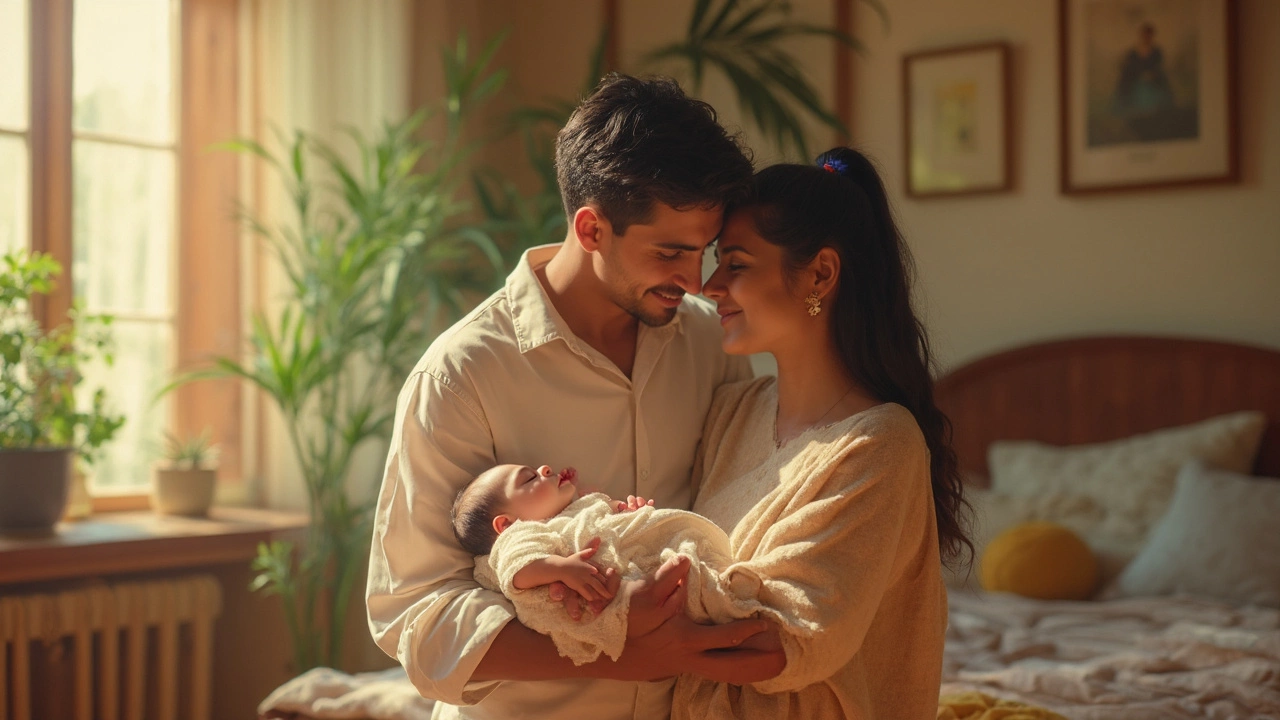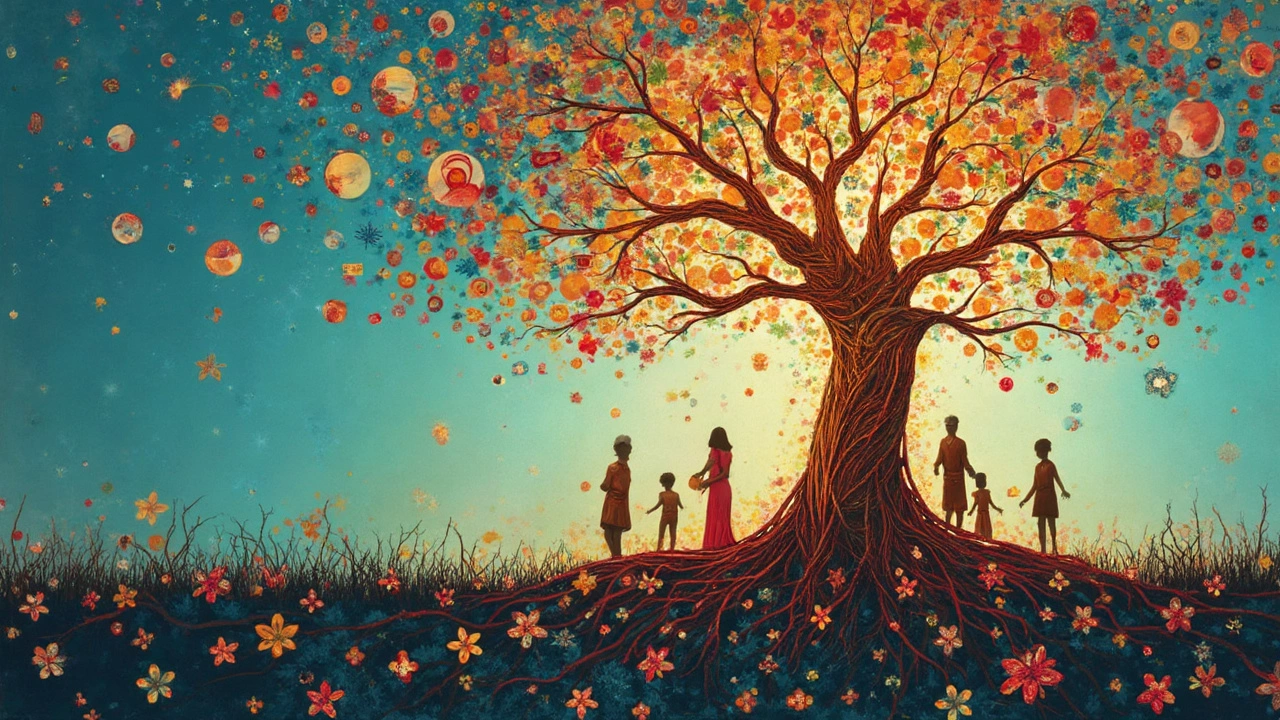
- Apr, 7 2025
- 0
Ever wondered if kids born through IVF can grow up and start families of their own? Spoiler alert: they totally can, and many already have! With IVF becoming more common these days, it’s only natural to start asking what happens when those first IVF babies replace their juvenile dreams with parental hopes.
Let’s dig into how these unique lives unfold. It’s not just science fiction anymore; in fact, tons of real-life stories are all around us. You might not hear about them daily, but folks conceived via IVF back in the day are stepping into parenthood, blending the miracle of science with the miracle of life.
If you're intrigued wondering what science has to say: IVF doesn't alter the ability to have kids. The reproductive health of IVF children is pretty standard, but there are always personal stories that defy expectations. And hey, the world of tech is fast-paced. In just a couple of decades, IVF itself has become more accessible and sophisticated, vouching for healthier, happier next generations.
- What Happens When IVF Babies Grow Up?
- The Real-Life Adventures of IVF Parents
- Science Behind IVF Babies Having Babies
- Busting Myths: IVF and Parenthood
- The Future of IVF Generations
What Happens When IVF Babies Grow Up?
So, you've probably heard about IVF babies, right? Those little ones who started life in a petri dish? Well, they're not so little anymore. Many of them are adults now, pondering the same life questions as everyone else—like starting a family.
Curious about how they fit into the big picture? First off, research suggests that kids born from IVF are generally just as healthy as those conceived naturally. In fact, one longitudinal study followed IVF kids into adulthood and found no significant difference in their health and well-being compared to their peers.
Busting some myths: folks used to worry IVF might mess with reproductive health for the next generation. But there’s no science backing that up. The ability for these kids to have babies seems to line up with the norm. And yep, some IVF babies are already parents themselves!
It's fascinating how quickly time flies—remember, the first successful IVF birth happened in 1978, and now here we are. As these adults start families, they sometimes choose IVF themselves, either due to personal choice or medical necessity. Technology has evolved quite a bit since their birth, improving success rates and making it generally more accessible.
Just imagine: we're potentially witnessing the start of multi-generational IVF families. It's not just science fiction anymore. Many are living proof of IVF's journey from groundbreaking to often considered routine practice. Their experiences enrich the conversation about reproductive choices and reflect society's gradual adaptation to advanced reproductive technology.
The Real-Life Adventures of IVF Parents
Diving into the stories of IVF-conceived kids now having families of their own is like opening a treasure chest of hope, tenacity, and science. Just imagine: the very first child born through IVF in 1978, Louise Brown, is now a mom to two kids naturally conceived. It’s a massive sign that life finds a way, no matter the roots.
Alright, here's the scoop: most IVF babies grow up just like any other kid. Many have become parents, proving that their ability to have children functions as it should. Science backs this up, emphasizing that being born through IVF doesn’t affect fertility or long-term health.
- Alice and John, both born via IVF, met during their college years. They proudly share that starting a family felt as natural as breathing—and yes, they’re now parents of lively twins!
- Take a look at Mark, another adult conceived through IVF. He's become an IVF advocate while raising his family, often speaking about the importance of this breakthrough technology.
There’s something beautiful about these stories. Each one is a testament to the advancements in fertility treatments, and they reassure hopeful parents that IVF isn’t just a fleeting chance; it’s an opportunity to create your next generation. Plus, sharing these success tales helps shrink stigma and embrace new-fangled concepts of family.
Oh, and if stats excite you, here’s a cool nugget: More than 8 million babies have been born through IVF worldwide. That’s a big number of potential new parents joining the adult world, with unique stories of challenges and victories.
No doubt, these stories encourage upcoming generations to not just dream about families but to build them, using the wonders of assisted reproduction. It’s about proving to the world and to themselves that IVF isn't just about making babies but about inspiring life-long possibilities.

Science Behind IVF Babies Having Babies
Alright, so let's break down what’s happening when IVF babies decide to have kids of their own. Many folks out there might wonder if being conceived through IVF would affect a person's ability to procreate naturally. The short answer? Not really! Studies so far show that most individuals born from IVF procedures have normal reproductive health.
Now, what's going on behind the scenes? IVF, or in vitro fertilization, doesn’t mess with your genetics in a way that impacts fertility in future generations. So, if you were conceived through IVF, your path to parenthood is much like anyone else's. Granted, if your parents needed IVF for reasons like certain genetic conditions, those could still be a factor for you.
If you’re curious about timelines, children born through IVF in the '80s are now in their 30s. They're paving the way for understanding how IVF impacts adulthood and parenthood. A cool thing to note is that today's IVF treatments are more advanced than those early days, meaning healthier outcomes.
And here's an interesting tidbit to drop at your next dinner party debate: some researchers have been digging into whether IVF-conceived folks do things differently when they start their own families. While there's no official rulebook that says they must, these individuals sometimes choose modern methods themselves, valuing the benefits of genetic screening and fertility tracking.
| Year of Birth | IVF Generational Data |
|---|---|
| 1981 | First known IVF baby born |
| 2021 | Many IVF-conceived individuals have own families |
In simple terms, the science behind IVF babies having babies isn’t as dramatic as you might think. It’s rooted in regular reproductive processes, mixed with some modern-day tech support, like IVF’s initial involvement. As IVF evolves, it only seems to enhance the potential for better outcomes, ushering in new generations with a touch of tech magic.
Busting Myths: IVF and Parenthood
With all the chatter around IVF, it's no surprise there's a fair share of myths floating around. First off, the notion that IVF babies might face fertility issues when they're older is just not true. Studies show that the fertility rates of those born through IVF are quite similar to those conceived naturally. This makes sense since IVF mainly alters the conception method, not the genetic makeup.
Dr. Jennifer Rohn from the University College London says, "We’ve found nothing in the data to suggest IVF babies are any less capable of starting their families. It’s a technology that assists conception, not one that tampers with the fundamentals of human reproduction."
Another popular myth is about the higher chances of health complications for babies born from IVF parents. But let’s break it down: these kids are like any other, healthy and thriving. The health checks during IVF treatments are rigorous enough to maintain high standards of safety.
Some folks also think that IVF leads to a higher likelihood of twins or triplets. While higher-order births were more common in the past due to transferring multiple embryos, modern practices now focus on transferring fewer embryos at a time, reducing those odds significantly.
- IVF is expensive: Sure, but with insurance coverages improving and tech advances, it’s becoming more affordable.
- IVF guarantees a baby: Not quite. Success rates can vary based on age and health, but it's certainly not a 100% sure thing.
- IVF is only for older women: Not true! Many younger women or couples facing specific fertility issues choose this route too.
The landscape of IVF is ever-evolving. What’s most important is knowing the facts and keeping updated with the latest developments. So, next time you hear a myth, give it a second thought and maybe do a bit of digging. You might just find that science says otherwise!

The Future of IVF Generations
Thinking about the future of IVF is kinda like peeking into a crystal ball full of science and potential. As we see more kids conceived through IVF reaching adulthood, it’s amazing to consider what comes next. Will they continue to use these technologies themselves? The answer seems like a big, resounding 'yes,' but with some interesting twists ahead.
Today’s advancement in IVF tech is mind-blowing. Remember, this wasn't even a thing until 1978 when the first IVF baby, Louise Brown, was born. Fast forward to now, and the landscape has changed drastically. For starters, techniques have become more refined, leading to better success rates and more healthy babies.
For future generations, we're potentially looking at even more breakthroughs, like genetic screening to prevent inherited diseases. There’s ongoing research into artificial gametes too, which might help infertility solutions, making the process even more accessible. It could mean more choices for people who choose IVF legacies.
Plus, as technology keeps evolving, costs could go down. Today, the expenses can be quite a barrier for many. Imagine if these advancements make it affordable for everyone! IVF would move from being a specialty to perhaps a regular part of family planning.
And let's not forget the societal shifts. More acceptance and less stigma around IVF are likely as more people become part of this expanding circle. Each new generation born from IVF seems to normalize it more, moving us further away from any lingering taboo.
As for stats, check this out:
| Year | IVF Success Rate |
|---|---|
| 1980 | 20% |
| 2025 | 35%-45% |
Crazy, right? If current trends continue, who knows where we could be in another few decades. One solid takeaway: as IVF continues to evolve, the possibilities seem endless. It's like each generation opens up more doors for the one that follows, making the future of IVF truly exciting.
Nikhil Verma
I'm a dedicated physician with a passion for exploring the intricacies of medicine, focusing on the unique healthcare challenges in India. I spend much of my spare time writing articles aimed at improving public understanding of health issues. Balancing my clinical practice and writing allows me to reach a wider audience, sharing insights and fostering a deeper appreciation for medical advancements. I derive immense satisfaction from both treating patients and engaging with readers through my writing.